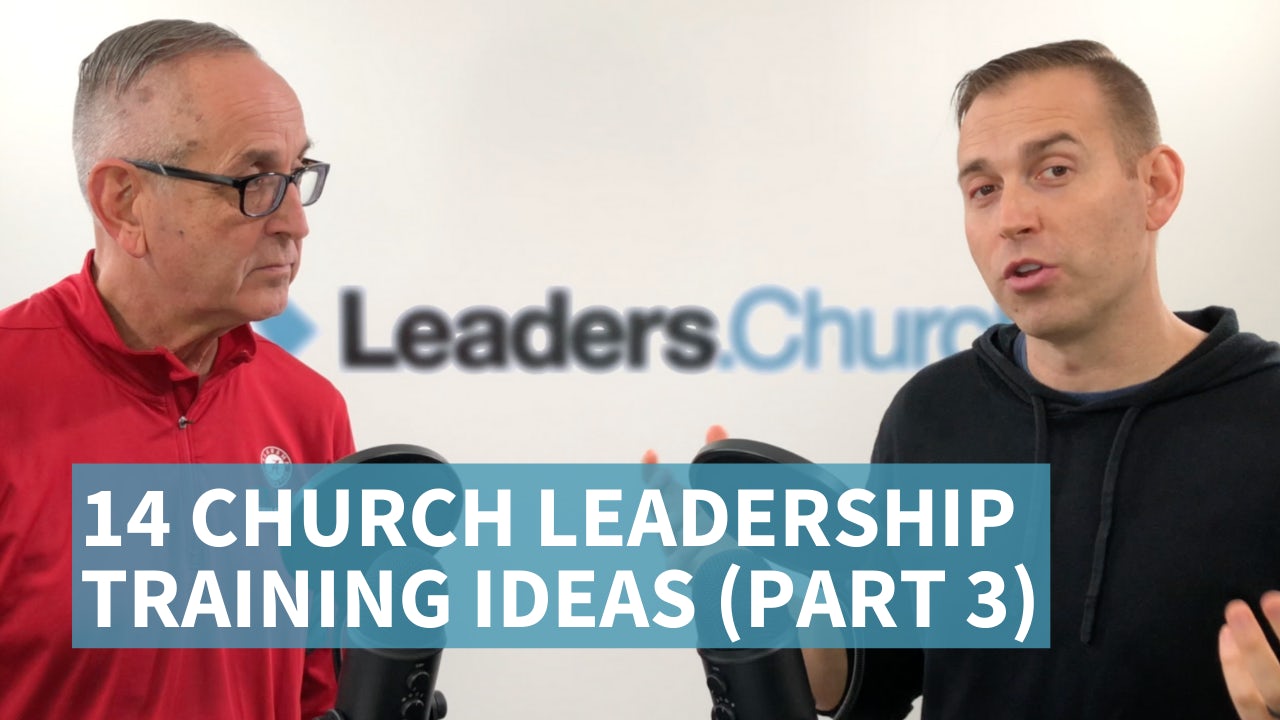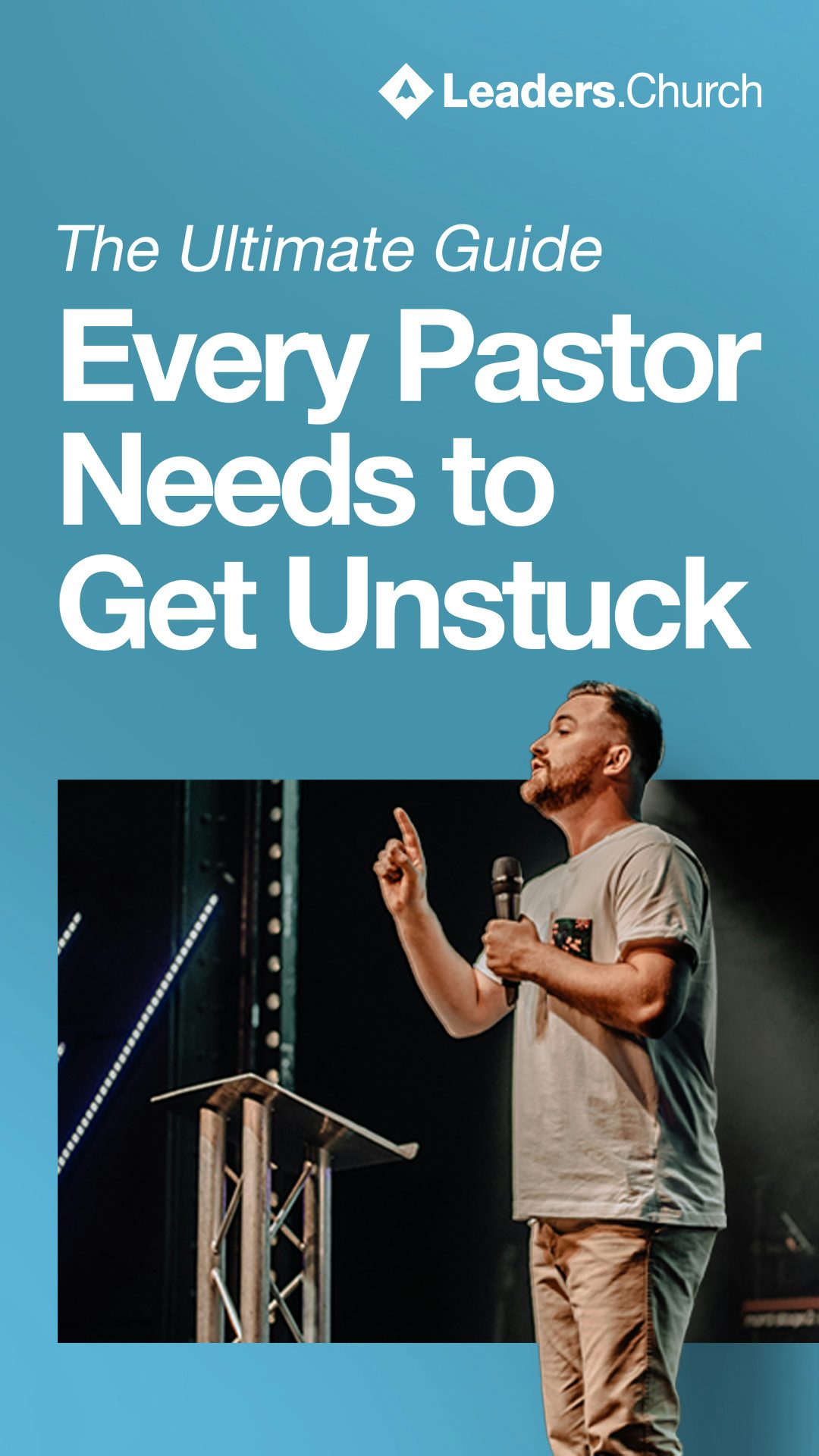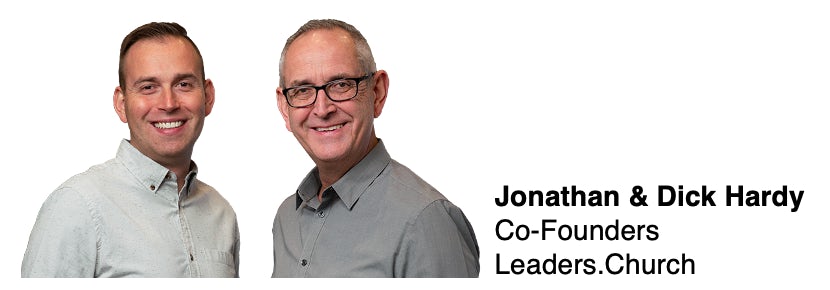011 – 14 Church Leadership Training Idea (Part 3)
What’s in this Episode?
If the greatest athletes of all time still need training, then how much more do the key leaders in your church need training? The fact is, they do need training, but if you’re going to do it right, then you need to put together training events that are helpful, effective, and one that leaves them longing for the next event. Well, in this episode, we’re going to continue our discussion of the three part series on how to conduct church leadership training events that people want to be a part of. Leaders.Church is committed to helping you grow more leaders.
Read the Transcript
Dick Hardy 0:29
When I was growing up, I wanted to be 6’6 in height. I landed at 6’4. So 6’4 is pretty tall, comparatively speaking, but I wanted to be 6’6. So as I’m starting to date, the nerdy guy that I am, I decided to find this woman by the name of Pat Mojeski, who’s 5’10 because if you want to have a tall son, that’s what I was hoping for, you want to marry a tall wife, a tall woman. So Pat, I get married and she’s 5’10 and we have this son. Now he ends up at 6’4. So I was hoping 6’6, 6’10, something like that so that he would make it big in the NBA and be able to take care of old dad when he’s old.
Jonathan Hardy 1:13
I’m sorry I let you down.
Dick Hardy 1:15
Let me down, so we just get to partner doing podcasts like this for you. But honestly, Jonathan and I we’re both very privileged to play with some very good basketball players in junior high and high school. Me, all the way back in 1972. Jonathan, in the year 2000, and we both had successful, very successful high school senior years. Only lost a total, I think of three games between the two of us in total, that senior year. So we felt very blessed. Along the way, part of that blessing was, I had coach Linky, he had coach Simpson, that helped way before February and March hit, when it’s all exciting to watch basketball. Way back at the beginning of October, November they were doing training. They were walking us through training, they were coaching us and bringing us along. So what does that have to do with us as pastors and church leaders? Well, we’re doing the same thing. We’re taking people, good volunteers, good athletes, good volunteers, and helping them be the very best they can be. So that’s why these episodes that we’ve been producing, (this is the third of a three part series), have been designed to give you 14 church leadership training ideas to help your training be all it needs to be. So I want to jump into the very first one today, we’ve gone through nine. So we’re going to talk through… Did I do that right, we’ve gone through 10. So we’re going to do four more today.
Idea #11: Be Obsessive With Start And Finish Times
Dick Hardy 2:45
And the very first tip for you should seem like a no brainer, but you got to pay attention to it. Be obsessive with start and finish times when you’re training people. And the reason for that is you are telling people what you feel about their time. And, because their time is valuable, and we’ve talked in previous episodes about how people are giving up their time, maybe on a Saturday morning for training. And if you say the training starts at nine, then you need to start at nine. If you say the training is going to end at 10, you end at 9:58, not 10:01. Because when you do that, who complains because you get out early? Nobody. So if you’ll be obsessive with start and finish times, you’re going to see then people want to come back to your training, and that’s a key point.
Jonathan Hardy 3:37
Well, and the moment that I feel like you cross over that 10 o’clock, illustration, from that point on, everyone is thinking about one thing. How much longer are we going to go over? Because you said 10, and it’s 10:01, 10:02, 10:03, 10:04, and you just, you know, it just keeps going and their looking at their watch.
Dick Hardy 3:58
You lose.
Jonathan Hardy 3:58
Yeah, and so they’re looking at their watch, at this point, you have lost them mentally. Yeah, they’re they’re no longer paying attention, because the thing they’re paying attention to first and foremost is, what am I getting out? Now some may because they don’t have anything coming up next. They don’t have the kids soccer game to go to or whatever. But some do. And so then they’re thinking, okay, how do I slip out? How am I going to get out of here without being a major distraction?
Dick Hardy 4:19
And believe me, when you do that, you’ve just told them don’t come to the next training, because they can’t trust you to do what you say you’re going to do.
Idea #12: Think Like Your Volunteers
Jonathan Hardy 4:28
That’s good, right there. Second thing. So you want to think like your team, or the volunteers. So when you go into a training, you want to put your… you want to put their mind in your mind. In other words, you want to act like a missionary. Kind of like a missionary does when they’re going to go to some other foreign country. Well, what do they do? They study the culture, they study the language they go, and they immerse themselves in the way of life for that culture. So that way they can reach them. Well, the same thing is true for us as we’re getting ready to train people. Whether it’s staff or there’s volunteers or whoever it is in the church that you’re going to be doing trainings for, you want to make sure that you’re putting your mind and yourself in their shoes, you’re thinking like them. So you’re going into it saying, okay, they just worked a full 40 plus hours this week, maybe 50 hours could have been 60 hours, and now, they’re coming on a Saturday, so how can I make this worthwhile for their time? Or it might be just the way that they view life and how they view the church, you know, if you’re the pastor, the people that are attending the church and involved in the church, how do they view what they’re coming to? How do they view this training? Because you view it from your perspective, how do they view it from their perspective?Putting your mind… changing your mindset to think like them, is huge. So that’s the second thing
Idea #13: Ask For Feedback
Dick Hardy 5:51
That really is. The third thing is to ask for feedback. Now this should go without saying, but we’re gonna say it, you’re never going to get better if you don’t have people who experienced what you’ve done, what you provided for them to talk to you and say, this is good, this is good. Most people are going to tell you everything’s wonderful, pastor, yeah everything’s fine. But every so often, you’ll get somebody who’ll say, you know, when you made that illustration like this, it really didn’t do what you wanted to do. Well, you need to know that. And you need to be open to that. You need to make it safe for people to give you feedback. Honestly, any time, I’m doing a training, I want to have pre printed ahead of time, forms that allow them to respond anonymously. You know, was this worth your time? Did this meet your expectations? You know, how was the food? You know, not a 20 page question, but four or five or six things that you would like to have the answer to just, yes, no, or ranking somehow that there’s no name on it and they can be safe and secure in giving you that feedback that’s gonna help you. And by the way, you don’t give that to them until the end.
Jonathan Hardy 6:51
Yes. So wait until you’re done.
Dick Hardy 7:08
They’re not on their table beforehand. And then you know, you’re gonna have people to fill the thing out before. Wait util the end, then hand it out. Which means, of course, you’ve got to finish up if you’re supposed to be done at 10, you better hand that out at 9:55 so that by 9:58, you’re sending them out the door.
Jonathan Hardy 7:27
I really like that. And I think to, the way you… there’s a couple things that come to mind, as you’re talking about that first is asking the right questions. So what are the things you’re wanting to evaluate on this training? What’s the feedback you want? Don’t ask feedback for something that you don’t care how they’re going to answer. Ask the feedback for the things that you genuinely want to know. Second thing is, the way you ask the questions is huge. If you just ask all yes or no questions, it’s not gonna be as effective for you. But what if you ask people to rate, you know, rate the food 1-5 or 1-10, whatever. Rate the content of the training. Then, obviously, you mentioned keeping it anonymous is huge as well. But I think making sure you’re asking the right questions and evaluating the right things is very important.
Idea #14: Critique Your Training
Jonathan Hardy 8:09
Okay, last thing. Critique your training. This is on your end, where you want to make sure that you critique your training. So now, this means you might… you’re going to analyze it, you’re going to look at and say, Okay, what did I do that went well? What did I do that could be improved for next time? How could I incorporate people in the training more to keep it more engaging? What other elements can I use to make it more engaging? And of course, we’ve talked about some of this stuff in episodes 9 and 10. So you can go back and check those out if you haven’t listened or watch those yet. But what you want to do is you got to figure out… basically it’s a self evaluation of the training itself, of the content, of your presentation. And I’d encourage you if you have it recorded, go back and watch it. And if you’re getting ready to do a training, once you think ahead now and say, let me record this so that I can figure out what… so I can then analyze it and make it better.
Dick Hardy 9:07
And I strongly encourage video recording.
Jonathan Hardy 9:09
Yes, yes. Sorry. That’s what I meant.
Dick Hardy 9:11
Yeah. Because you want to watch your mannerisms when you’re doing this. And you’ve just gotten done asking for feedback. So you’ve got these papers where people have done things. So part of your critiquing, is actually paying attention to what people said to you.
Jonathan Hardy 9:27
Yeah. And this just goes to the whole idea of constantly working to improve. And, you know, we, in one of the episodes, we’re going to be talking about creating a culture of improvement, because improving things is so important for us. We’re never going to strive for excellence because excellence is different in everyone’s opinion. But improvement is something we can always work for. How can we take what we’ve done and make it better? So that’s what you want to do as your critique your training. How can I take what I’ve done and make it better? And really, I would encourage you to do that with your overall leadership in life. And that’s why we want to encourage you to take the Five Day Leadership Challenge if you have not yet done so, this is a five day, 15 minute per day investment in your life and leadership to help you get better and improve your personal leadership, because the better you are as a leader, the better you’re going to be leading the church in the ministry and it’s just going to help you make a bigger difference. And so you can sign up for that. It’s free. Go to Leaders.Church/challenge. Again, Leaders.Church/challenge. You can sign up for that, and you’ll be good to go. So Dick, give us a quick recap here of what we talked about today.
Recap
Dick Hardy 10:30
Well, we’ve just talked about… (and we’re not going to go through all 10 of the items so you can certainly watch or listen to episodes 9 or 10,) but the four that we talked about today is, first, to be obsessive with start and stop times. And secondly was to think like your team and volunteers. Third is to ask for feedback. And the fourth is to critique your own training. If you’ll do these four things, along with the 10 that we talked about, and I know we’re talking about a boatload of things to do, but if you’ll do these things, you’ll see your ability to lead your training to brand new levels. And when you get better through the Five Day Leadership Challenge, and you train better, your volunteers get better, your ministry gets better, everything goes better.
Jonathan Hardy 11:23
And I might just add to that, you know, while we kind of just, you know, fed you with a fire from the fire hydrant in some regards, over these three episodes. The idea is just take one. Start with one. How can I take one idea here, have these 14 ideas and implement them to make it better, that’s all it is. Start there. And then once you get that one down, go down the next one. And so just, you know, slowly as you can implement these things, and this is what’s going to help make your trainings the most effective, the most engaging, and most beneficial for those that are part of it.
Dick Hardy 11:56
Exactly.
Jonathan Hardy 11:56
So, before you go today, make sure to subscribe if you haven’t yet subscribed to our channel, whether it’s YouTube, whether it’s one of the podcast platforms, we would love to have you subscribe so you can get notified of future episodes coming out. And anything else?
Dick Hardy 12:09
Nope. That’s it.
Dick Hardy 12:09
All right. Well, thank you so much for being with us today. We’ll look forward to seeing you next time. Until then, take care and be blessed.
Subscribe & Follow:
- Subscribe on Apple Podcasts
- Follow on Spotify
- Subscribe to YouTube Channel
- Subscribe on Google Podcasts
- Like us on Facebook
- Follow us on Instagram
- Follow us on Twitter









